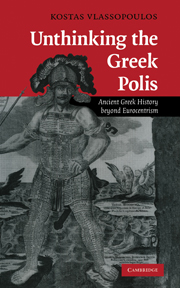Book contents
- Frontmatter
- Contents
- Acknowledgements
- Abbreviations
- Introduction
- PART I DEFINING THE CONTEXTS OF THINKING ABOUT THE POLIS
- PART II RETHINKING THE CONTEXTS. THE POLIS AS AN ENTITY: A CRITIQUE
- PART III BEYOND THE POLIS: THE POLIS AS PART OF A SYSTÈME-MONDE
- 6 The polis as a unit of analysis: poleis and koinôniai
- 7 Poleis and space
- 8 Poleis and polities
- 9 Poleis and time
- 10 Towards new master narratives of Greek history?
- References
- Index
10 - Towards new master narratives of Greek history?
Published online by Cambridge University Press: 22 September 2009
- Frontmatter
- Contents
- Acknowledgements
- Abbreviations
- Introduction
- PART I DEFINING THE CONTEXTS OF THINKING ABOUT THE POLIS
- PART II RETHINKING THE CONTEXTS. THE POLIS AS AN ENTITY: A CRITIQUE
- PART III BEYOND THE POLIS: THE POLIS AS PART OF A SYSTÈME-MONDE
- 6 The polis as a unit of analysis: poleis and koinôniai
- 7 Poleis and space
- 8 Poleis and polities
- 9 Poleis and time
- 10 Towards new master narratives of Greek history?
- References
- Index
Summary
This final chapter will serve as an answer to the question that many readers might wish to ask. This book has tried to show how we came to study Greek history in a Eurocentric manner; it has also tried to show why this way of studying Greek history is misleading and problematic; it has finally attempted to provide a scaffolding of what concepts we need in order to construct such an alternative history. The question now is: how do you envisage writing such a history? It is all very well arguing that we need to avoid an account centred on the polis, which usually turns out to be Athenocentric history; but given our type of evidence, what else can we do? It is all very well arguing that we need to go beyond Hellenocentric accounts; but, given the evidence surviving, how can we introduce, for example, the Phoenicians in our accounts, since none of their records has survived? It is all very well arguing that we need a story with many levels and many durations of historical time, instead of teleological and unidimensional accounts; but how is it actually possible to write such a narrative? It is all very well showing the fallacies of Eurocentric master narratives; but can we construct any other kind of master narrative, or should we simply be content with a non-Eurocentric ‘histoire en miettes’?
- Type
- Chapter
- Information
- Unthinking the Greek PolisAncient Greek History beyond Eurocentrism, pp. 221 - 240Publisher: Cambridge University PressPrint publication year: 2007



